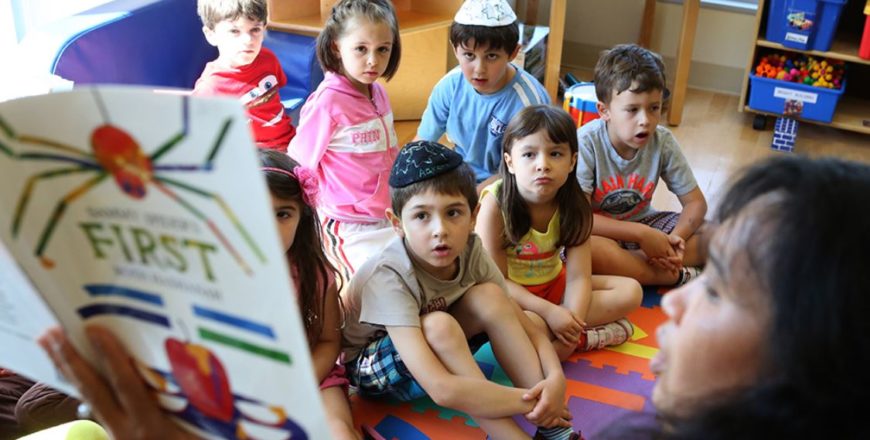
Strengthening the Toronto Jewish Community: Q&A with Dan Held, UJA Federation of Greater Toronto
Since 2014, UJA Federation of Greater Toronto has engaged Rosov Consulting to gain important data and insights about many aspects of local Jewish life and the needs of its community. To share the nature of this work with others, we recently sat down for a Q&A with Daniel Held, Chief Program Officer at UJA Federation of Greater Toronto. We hope you enjoy his insights and learnings.
What is your role and responsibility at UJA Federation of Greater Toronto?
As the chief program officer at UJA Federation of Greater Toronto, I’m responsible for developing our strategy, our investments, and strengthening the local Toronto Jewish community so it is a vibrant community both today and into the future.
I’ve been at Federation for eight years. For the first seven I was Executive Director of the Julia and Henry Koschitzky Centre for Jewish Education, and then I moved into this role about a year ago.
Why has UJA engaged Rosov Consulting in so many different areas?
At Federation, we work on behalf of donors and the community. We really believe that the basis of being strategic is making evidence-based decisions. Whether it involves resource allocation, program implementation, or something else, our decisions need to be based on research, not just what we hear on the street or feel in our gut.
So, we’ve turned to Rosov Consulting many times to help us build the evidence base to make those strategic decisions. Rosov works directly with our partners, including community members and agencies, in really powerful, meaningful, and engaging ways. At the end of the day, they deliver a product that can help us develop and drive strategy.
Can you share a little bit about the key learnings? Were there any surprises or findings that really informed a certain direction?
We’ve worked with Rosov on a number of projects, from understanding who PJ Library families are in our community, to looking at Jewish day school affordability, to work around Israel engagement. In this latter area, we wanted to set a baseline for understanding our community’s engagement with Israel so that we could determine how to deepen our impact. From that research, we learned that summer camps presented an opportunity for more Israel engagement and greater impact with youth in that area.
But the most impactful work was around the retention rate of students between 8th grade and 9th grade at Jewish day schools. We learned that our community was not retaining as many students as we wanted to, and the factors families weighed as they made that decision. As a result, we launched a significant initiative to change the financial structure of our high school. We raised $14 million, and along with other initiatives, we were able to reduce tuition at our high school.
Enrollment in 9th grade has gone from 175 students just 5 years ago to 355 students today. Based on the hockey-stick like growth at our high school, we’ve now launched Generations Trust, a large-scale endowment to create new scholarships for our elementary schools. These programs all stem from this research that demonstrated that if we were able to act on the issue of affordability, we’d be able to engage more families
Your work with Rosov Consulting covers so many different areas of Jewish engagement. Are there common threads or a defining principle behind these efforts?
There really are four major objectives that we’re seeking to accomplish in our work with Rosov, which are all interrelated.
- How do we reach the greatest number of the 200,000 Jews in Toronto? Our work with PJ Library and in day schools and with others hits that goal.
- Of those we are reaching, how do we empower them to live a Jewish life and to lead our Jewish community into the future? We’re actually working with Rosov right now on a project to define what empowerment means and to identify programs across North America that we think truly empower young people.
- As I mentioned, affordability is an important focus as well. We want to lower this as a barrier to engagement, because we know that will allow us to reach and empower more people.
- We are also focusing on deepening the relationship of young Jews to Israel.
We consistently think about these four strands. This process can only be driven by:
- an evidence-based strategy;
- good data with locally developed ideas; and
- good thinking about what a strategy should look like.
First, I’d say a lot of these projects could not be done by Federation alone but have to be done in partnership with others. For example, we relied on six elementary schools to be participants in the day school research projects. In the work we’re doing right now in empowerment, we’re leaning on a number of rabbis, camp directors, and others.
One of the things that Rosov brings to the table is the ability to bring others into exciting conversations. People feel like they are part of an important conversation, which is a really critical piece. That has been tremendously helpful.
Is there anything else about the work, or the process, or the learnings that you think would be helpful for others to hear when thinking about this type of engagement themselves?
We have a lot of stakeholders when we do big change projects, and it requires us at Federation, including our own lay leadership and professional leadership, to buy into that change. It requires a lot of agency partners, be they schools or camps or synagogues or youth movements or JCCs or others, and it requires donors to buy-in in really powerful ways. The ability of both Rosov professionals and their reports to speak to multiple stakeholders gives us a real value-add and helps to bring about the real kinds of change we want to see in our community.




